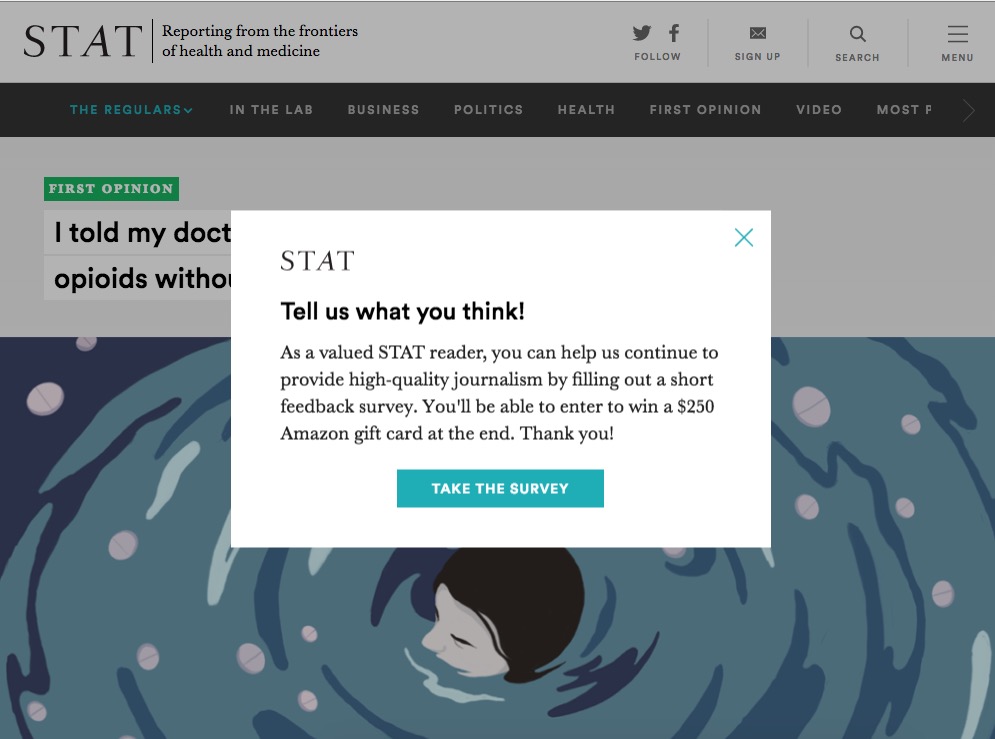
Stat, the health and life sciences news site launched last year by Boston Globe owner John Henry, plans to introduce a paywall by the end of 2016, as part of a goal of emphasizing the national scope of its coverage.
Stat launched last November with more than 50 staffers, and chief revenue officer Angus Macaulay said some sort of paid offering was always part of the plan. “Even before we started hiring people and were doing the original market assessment, having some sort of paywall was always part of it,” Macaulay said. “It’s getting harder and harder for advertising to support media brands.”A portion of the site will remain free, but Macaulay’s team is in the process of determining which coverage areas readers would be willing to pay for. The site is hiring a subscription marketing manager.
Stat has surveyed its email newsletter subscribers and last week began running a survey on its site. So far, Macaulay said the audience is “skewing heavily” toward readers who are coming to the site out of professional interest.

According to the survey’s results so far, readers are particularly interested in biotech, pharma, and hospital coverage. As a result, editor Rick Berke said that Stat is hiring additional reporters and expanding its coverage of those areas.
When the site launched, it branded its biotech coverage around Cambridge’s Kendall Square, the research hotbed that’s home to MIT, and much of its hospital coverage was focused on the Longwood Medical Area in Boston, home to the Harvard Medical School and a number of hospitals.
The biotech coverage was rebranded as The Readout last month and relaunched as an email newsletter. A new moniker and newsletter for the hospital coverage are in the works. Stat is hiring another national hospital reporter and recently hired a Cleveland-based biotech reporter.
Though Stat officially launched last November, it began publishing stories on The Boston Globe’s website and in the print paper in August 2015. Stat and the Globe still share about 10 stories per week, Berke estimated. Last week, for instance, Stat published a first-person essay by writer Seth Mnookin on receiving prescription opioids as an ex-addict. That story also ran on the front page of the Globe.
As a result of the Globe partnership and the Harvard/MIT focus, in Stat’s first month as a standalone site, 28 percent of its readers came from Massachusetts. Now, only 19 percent of Stat’s readers are from the Bay State, and the site hopes to see more readers coming from elsewhere in the U.S. and abroad as it implements its paid content strategy. The company said in February that a quarter of its readers come from abroad.Citing Omniture, Berke said Stat had more than 800,000 unique visitors in May. Macaulay said the site is “well on track” to its traffic goals and that “We’re well past a lot of the trade brands who have four, five, six hundred thousand uniques.”
Presumably, adding some kind of paywall will impact traffic, but Stat hasn’t yet worked out how much content will remain free, or what it will charge for access.
Macaulay acknowledged that Stat won’t be able to charge the high fees that sites like Politico Pro charge for granular inside information. “It won’t be a $2,000 or $3,000 product,” he said. “We aren’t there yet. That is a longer-term vision. Let’s get a base product.”
Stat sees digital subscriptions as part of a three-pronged revenue strategy that also includes advertising and events. Macaulay also wouldn’t say how much money Stat has made from advertising, but said the site is “on track to hit or exceed our first-year revenue goals,” with 32 different advertisers. About 90 percent of advertising revenue has come from native ads.
Stat hosted its first event — a breakfast discussion with Brandeis University biology professor Gina Turrigiano — on May 19. Its next events will take place during Boston’s HubWeek, a city-wide festival focused on innovation. Stat may also do a custom event or two for advertisers later this year.
Ultimately, though, Stat’s team thinks its success will be based on the quality of its reporting and journalists. “There’s a basic philosophy we’ve had from the start, that John Henry has had from the start,” Berke said. “People will pay for journalism that’s ambitious, and important, and that you can’t get anywhere else.”
Note: Stat initially declined to provide a monthly traffic number before publication; that was added after this story went up. The piece initially cited Quantcast, whose traffic numbers for non-partner sites are estimates and which Stat disputes, reporting about 130,000 monthly uniques from U.S. browsers.